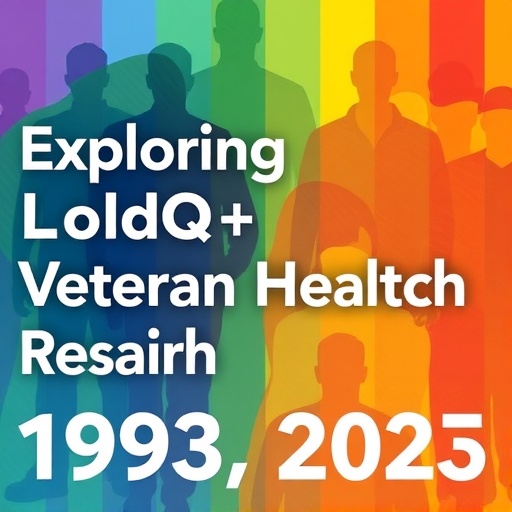The landscape of healthcare for LGBQ+ veterans and service members is an increasingly important area of study, particularly as societal awareness of sexual orientation and gender identity continues to grow. A recent scoping review published in the Journal of General Internal Medicine sheds light on the existing research concerning the health and healthcare experiences of this often marginalized group, spanning from 1994 through 2023. This extensive review underscores the urgency of addressing the unique health challenges faced by LGBQ+ service members and veterans, who have historically been overlooked in medical studies and health policy discussions.
LGBQ+ veterans and service members represent a diverse community with distinct health care needs that may differ from their heterosexual and cisgender counterparts. They are often at higher risk for certain health issues, including mental health disorders, substance use problems, and chronic diseases. This vulnerability can stem from various factors, such as the stigma associated with their sexual orientation and the general challenges of military life. The review methods employed by the researchers, including systematic analysis of existing literature, highlight the significant gaps in knowledge related to LGBQ+ veterans’ health, calling for a greater research focus to understand and mitigate their specific health disparities.
The study encompasses various dimensions of health care, illustrating the multifaceted nature of care required by LGBQ+ service members and veterans. Mental health has emerged as a prominent area of concern, with many in this demographic experiencing higher rates of depression, anxiety, and post-traumatic stress disorder (PTSD). These mental health issues are compounded by the experiences of discrimination and the lack of adequate support systems within the military, emphasizing the necessity of culturally competent care that recognizes and addresses these unique stressors.
Furthermore, the role of healthcare provider bias against LGBQ+ individuals can exacerbate the existing health disparities. The scoping review noted examples of prejudiced attitudes within healthcare environments, which frequently lead to delayed treatment and decreased utilization of necessary services. A deep understanding of these biases and their impact is crucial for improving healthcare delivery, ensuring that LGBQ+ veterans receive equitable treatment and access.
Physical health issues also emerged from the literature surveyed in the review, indicating that LGBQ+ veterans may face higher risks for ailments such as cardiovascular disease and obesity. These issues may be linked to various social determinants of health, including socioeconomic status and access to preventive care. The authors of the review argue that further research is necessary to develop effective intervention strategies tailored to this population’s unique health profiles.
The review also highlights how the intersectionality of race and ethnicity further complicates health care for LGBQ+ veterans and service members. The studies included in this analysis reveal that minority LGBQ+ individuals often experience compounded discrimination, which can lead to an exacerbation of health disparities. Understanding how these intersecting identities affect health access and outcomes is vital for generating appropriate healthcare policies and practices.
Additional avenues of research identified by the study include the need for increased focus on reproductive health issues facing LGBQ+ veterans and service members. Sexual health concerns are critical yet remain under-researched in this demographic, necessitating more expansive studies that could cover necessary health education and clinical practice guidelines tailored for LGBQ+ individuals. Comprehensive sexual health resources must be integrated into the veteran healthcare framework to address these needs effectively.
The review also points to the importance of internet and technology use in facilitating health care access and information dissemination among LGBQ+ veterans. Digital platforms can serve as valuable tools in promoting health literacy and connecting service members with appropriate support networks. However, attention must be drawn to the digital divide that may still exist, hindering access for some veterans who lack internet access or digital literacy.
Moreover, this scoping review emphasizes the role of community and peer support systems in promoting healthier outcomes for LGBQ+ individuals in the military. Establishing strong support networks within the veteran community could vastly improve both mental and physical health outcomes. Programs that focus on building resilience and fostering social connections are essential, particularly given the isolating experiences that many LGBQ+ veterans face.
Finally, the review provides a comprehensive roadmap for future research efforts and policy development aimed at improving the health care experiences of LGBQ+ veterans and service members. By collating data from literature spanning nearly three decades, the authors set forth a clear challenge to the medical community to prioritize LGBQ+ veterans in future health initiatives. It is not only a moral obligation but also a necessity for ensuring equitable healthcare delivery for all individuals who have served in the armed forces.
Overall, the review stands as a clarion call for the health care community to recognize and act upon the distinct needs of LGBQ+ veterans and service members. By acknowledging the myriad challenges this population faces and investing in targeted research, we can work towards achieving health equity for those who have dedicated their lives to serving their country.
Subject of Research: Health and healthcare of LGBQ+ veterans and service members
Article Title: LGBQ+ Veterans and Service Member Health and Health Care: A Scoping Review of Research from 1994 to 2023
Article References: Harper, K.L., McConnell, A., DeFiori, K. et al. LGBQ+ Veteran and Service Member Health and Health Care: A Scoping Review of Research from 1994 to 2023. J GEN INTERN MED (2025). https://doi.org/10.1007/s11606-025-09881-0
Image Credits: AI Generated
DOI: https://doi.org/10.1007/s11606-025-09881-0
Keywords: LGBQ+, veterans, service members, health care, mental health, health disparities, intersectionality, healthcare access.
Tags: addressing unique health challenges for LGBQ+chronic diseases in LGBQ+ veteranshealthcare challenges for LGBQ+ service membershealthcare needs of sexual minoritieshistorical neglect in medical studiesimproving health policies for LGBQ+ veteransLGBQ+ veteran health researchmental health issues in LGBQ+ veteransmilitary life impact on LGBQ+ healthstigma and health disparitiessubstance use disorders in LGBQ+ populationssystematic review of veteran health literature





